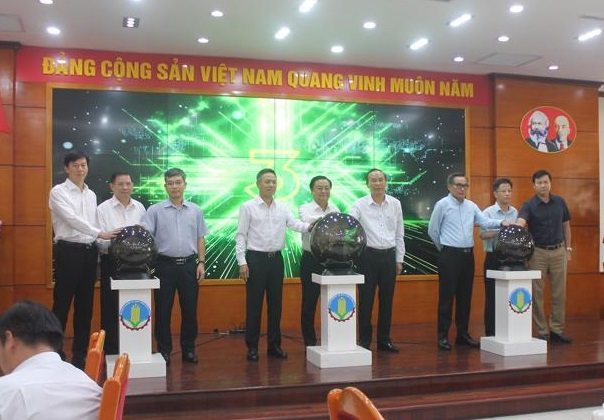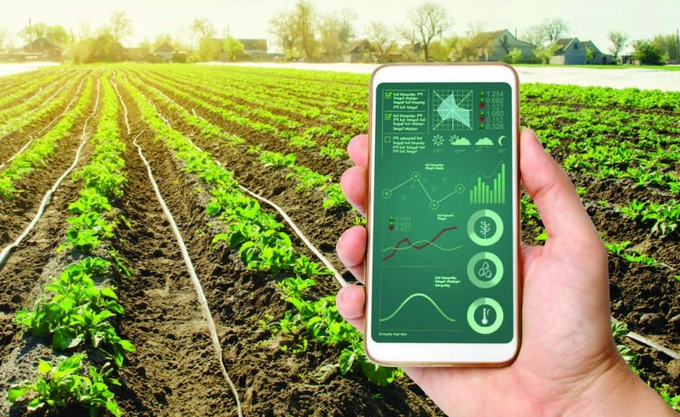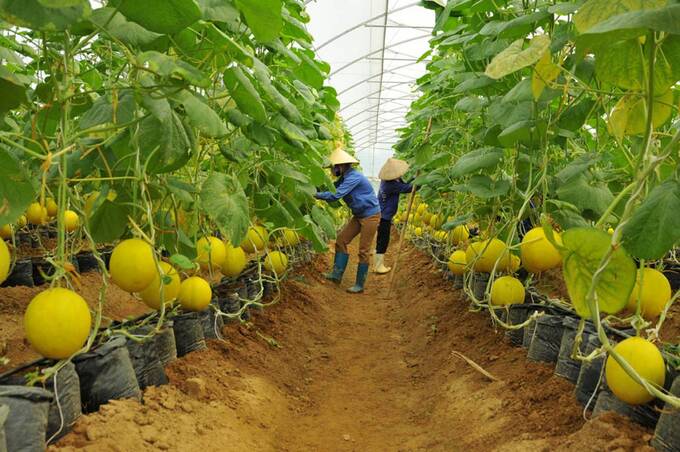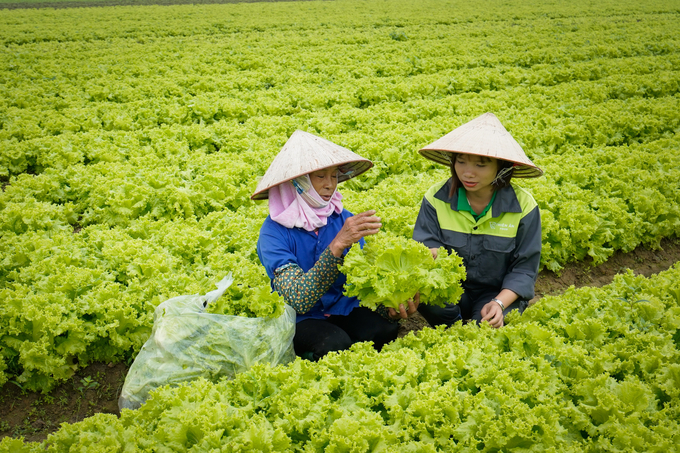May 21, 2025 | 06:08 GMT +7
May 21, 2025 | 06:08 GMT +7
Hotline: 0913.378.918
May 21, 2025 | 06:08 GMT +7
Hotline: 0913.378.918

The Ministry of Agriculture and Rural Development recently launched the "Digital transformation of agriculture and rural development" project and announced the implementation of an information - database system for granting and managing planting area codes.
The digital transformation of agriculture in Vietnam contributes significantly to improving productivity, profits, optimizing production; creating an environment whereas the agricultural digital ecosystem is the foundation; establishing institutions, promoting the transitioning from agricultural production to agricultural economy; developing high-tech agriculture with special focus on smart agriculture and precision agriculture; increasing the proportion of digital agriculture in the economy.
To this end, the Ministry of Agriculture and Rural Development followed the Government's direction on digital transformation and coordinated with VNPT Group to develop a national database system on agriculture. This is an important step to link agricultural production with the market, which helps faciliate the quick and convenient update as well as the connecting and sharing of information. The digital transformation of the agricultural sector is established on three pillars including: digital Ministry; digital agricultural economy; digital rural areas and farmers.
According to the plan for 2022, the Ministry of Agriculture and Rural Development will focus on promoting digital transformation in two main areas: livestock and farming. The livestock information system and database was published on June 15, contributing to improving the efficiency of livestock management in compliance with the Law on Livestock; proactively connect information between state management agencies, businesses and breeders.
Regarding crop production, during the launching ceremony of the "Digital transformation of agriculture and rural development" project on August 19, the Ministry of Agriculture and Rural Development announced the implementation of an information system and database for granting and managing planting area code.
According to the Department of Crop Production, Vietnam currently has over 4.8 million hectares of perennial crops, with 1.17 million hectares of fruit trees, 2.2 million hectares of industrial crops, and 3.9 million hectares of rice, 64,000 hectares of dragon fruit among many other crops.
In many provinces, production areas have been formed with strong linkages between farmers, cooperatives, processing factories and businesses consuming products. Namely, many regions have been granted identification codes to monitor and control production, traceability, as well as improve the quality of agricultural products.
However, the implementation of code issuance remains fragmented, small and disconnected in terms of information between production and the market, despite the increasing demands from domestic and international consumers for traceability and quality of agricultural products. This requires the agricultural sector to accelerate the digital transformation of crop production.
Ms. Tran Thi Hoa, Deputy Director of the Department of Crop Production, said: With the approval of the Ministry of Agriculture and Rural Development, the Department was assigned to be in charge and coordinate with VNPT Group to organize the pilot implementation of the national database system on crop production, with the "csdltrongtrot.mard.gov.vn" website to promptly meet the urgent requirements regarding production practice and management needs under the Law on Crop Production.
The national database system on crop production will be the foundation to create active connection and two-way information sharing between state management agencies and people, businesses operating in the field of crop production. This system will help accurately and timely update crop data such as: List of circulating varieties, protected plant varieties, crop structure transformation areas, legal documents, productiona areas and so on.

The national database system on crop production will fully integrate information regarding the list of circulating varieties, protected plant varieties, crop structure transformation areas, granting and management of planting area codes.
In response to the decision of the Ministry of Agriculture and Rural Development to issue temporary guidance documents on the grant and management of planting area codes in the national database on crop production, the Department of Crop Production has integrated a national database system for granting and managing planting area codes.
According to Ms. Tran Thi Hoa, this system allows the establishment of planting area codes for production facilities nationwide. Moreover, it will provide a platform to grant and manage planting area codes online with the full process from registration, verification and issuance of planting area codes in a timely manner.
Furthermore, the Department will promote: electronic diary recording; utilizing the planting areas database for different purposes such as policy formulation, production direction, regulation, supply and demand connection, transfer of technical advances, estimation, forecasting, monitoring and control of production, product quality control, traceability of agricultural products, etc.
This is an important basis for the Department of Crop Production to stabilize output, control quality, increase competitiveness and develop sustainably to meet market requirements.

The system of granting and managing planting area codes will help local governments, people and businesses manage, look up information, as well as orient production and markets with ease.
Ms. Hoa added: The completion and introduction of the national database system on crop production and the database of granting and management of planting area codes demonstrates the determination and the great efforts of the Ministry of Agriculture and Rural Development as well as the Department of Crop Production in accelerating the process of digital transformation in agriculture.
Before the database on crop production was unified, people, businesses and management agencies had to contact the focal points of the Department of Crop Production directly when in need of assistance. However, once the database system enters operation, people, businesses, and management agencies only need to log in to the system to be able to look up information as needed. The database will unify the management and dissemination of information in addition to saving time, effort, and cost for stakeholders.
Regarding the national database system for granting and managing planting area codes, people and businesses can register entirely online. When they log in to the system, they will gain access to knowledge regarding farm and crops' suitability, expected output, harvest time, specific needs for each type of crop, etc. for management activities.
In addition to the website, the Department of Crop Production has cooperated with VNPT to build a mobile phone application; providing a portable solution so that stakeholders can easily access, gather information, and utilize the database system.

Information on a public and transparent national database system will help in the identification of Vietnamese agricultural products, in favor of businesses, cooperatives and farmers. Photo: Trung Quan.
The Department of Crop Production has recently put the database system for granting and managing planting area codes into trial operation in several select provinces. After the trial run, the Department will coordinate with VNPT to gather feedback, evaluations and suggestions from participants to continue to improve the system.
Subsequently, the Department will work with VNPT's technical staff to organize training courses on instructions to operate the system for professional agencies, people and businesses in different provinces to synchronously deploy in 63 provinces and cities in the future.
Deputy Minister Phung Duc Tien emphasized: The establishment of a database system to update and manage planting area codes is critical to the identification of Vietnamese agricultural products, contributing to building credibility, affirming the brand name and quality of Vietnamese agricultural products in domestic as well as foreign markets, in favor of farmers, cooperatives and businesses. When the system enters operation, it will bring many practical benefits to management agencies, businesses and farmers alike. Namely, it will help the monitoring and controlling of production; product quality control at source; traceability of plant products; supporting and connecting product consumption markets; consulting and technical support for farming.
Translated by Nguyen Hai Long

(VAN) Japan's grant aid project contributes to capacity building, promoting organic agricultural production, and fostering sustainable community development in Dong Thap province.

(VAN) For years, the CRISPR-Cas9 genome technology has been reshaping genetic engineering, a precision tool to transform everything from agriculture to medicine.

(VAN) Vietnam aims to become a 'leader' in the region in the capacity and managing effectively soil health and crop nutrition.
![Reducing emissions from rice fields: [Part 1] Farming clean rice together](https://t.ex-cdn.com/nongnghiepmoitruong.vn/608w/files/news/2025/05/05/z6509661417740_a647202949c539012a959e841c03e1d3-nongnghiep-143611.jpg)
(VAN) Growing clean rice helps reduce environmental pollution while increasing income, allowing farmers to feel secure in production and remain committed to their fields for the long term.
/2025/05/19/5136-1-144800_230.jpg)
(VAN) The Nghe An Provincial People's Committee has just approved the list of beneficiaries eligible for revenue from the Emission Reductions Payment Agreement (ERPA) in the North Central region for the year 2025.

(VAN) 14 out of 35 domesticated elephants in Dak Lak province have had their living conditions improved, with 11 of them currently participating in the non-riding elephant tourism model.

(VAN) Muong Nhe Nature Reserve hopes that being upgraded to a national park will lay the foundation for forest protection efforts to be carried out in a systematic, modern, and sustainable manner.